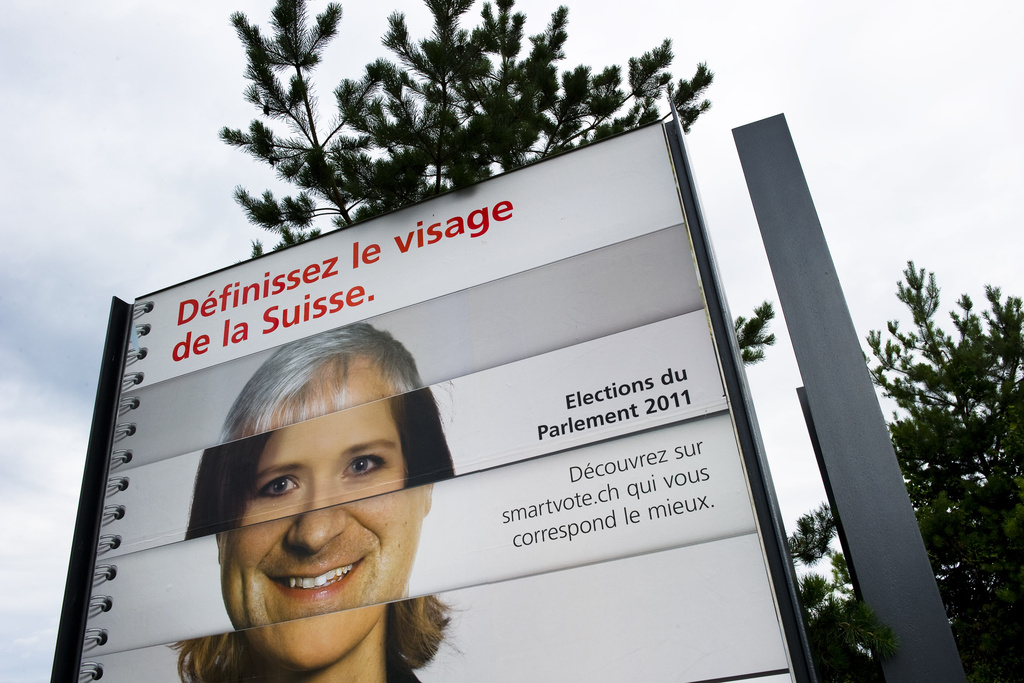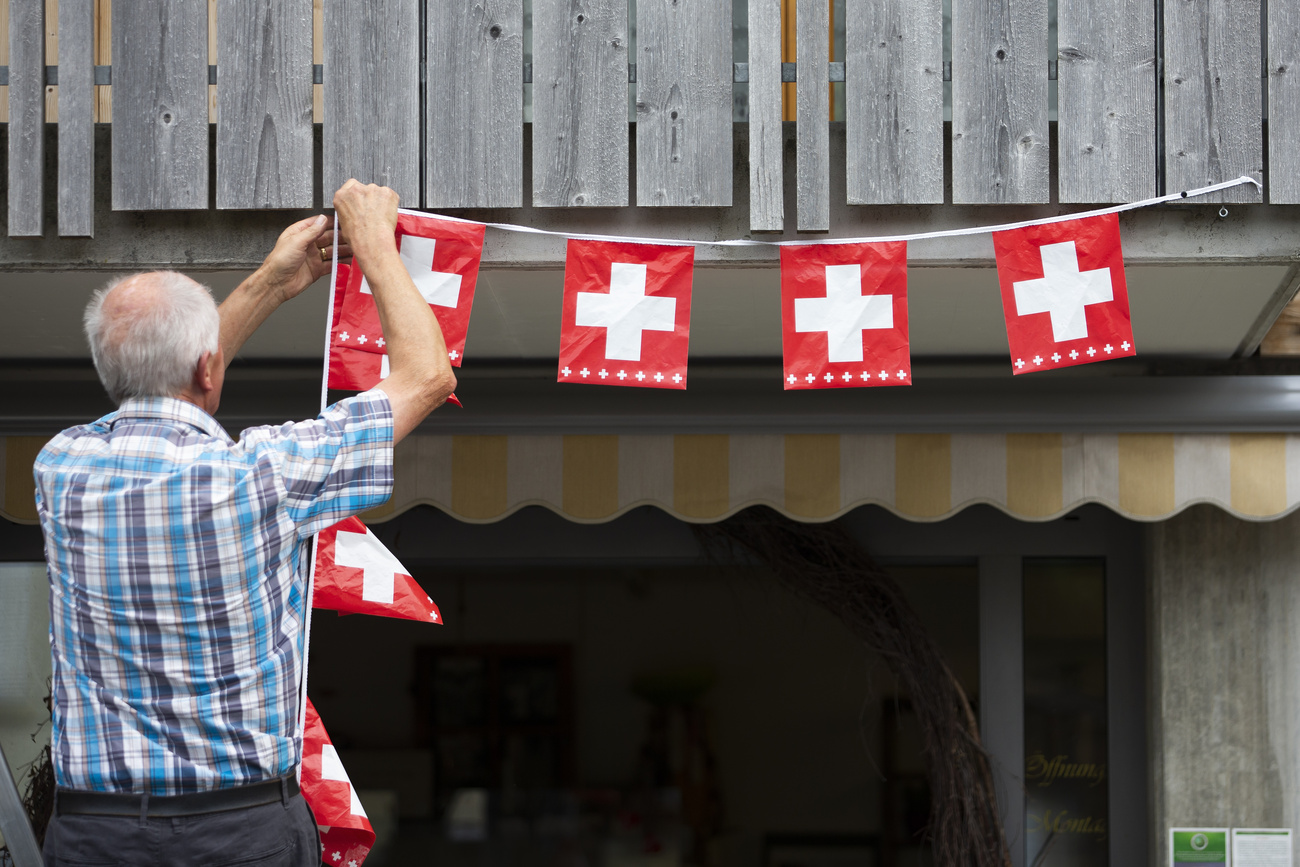
Cabinet vacancy to define final campaign stage

The remaining weeks in the run-up to the October 23 parliamentary election are set to be dominated by controversies over the make-up of the seven-member cabinet.
Political scientist Claude Longchamp says the planned resignation of the social democrat foreign minister, Micheline Calmy-Rey, marks a shift from specific topics, including immigrants, nuclear energy and the economy, to a personality-focused campaign.
The latest survey by his leading gfs.berne polling and research institute was carried out among more than 2,000 citizens across the country on behalf of the Swiss Broadcasting Corporation.
“A conflict is now likely to develop mainly between the two parties at opposite ends of the political spectrum,” said Longchamp.
He says other parties will inevitably be drawn into a battle between the Social Democrats and the Swiss People’s Party over the number of seats in the multi-party cabinet.
The outcome of the discussions remains to be seen, but Longchamp sees the Social Democratic Party in a good position for the coming weeks.
Advantage
He believes that the party should, in principle, benefit from the resignation of Calmy-Rey as the debate over possible successors draws additional media attention. It gives the Social Democrats a public stage to fend off attacks on their second cabinet seat by other parties, and from which to mobilise their supporters.
The main centre-left party also made slight gains in the latest poll, published on Friday, and would win just over 20 per cent of the vote if the election was held this weekend.
Longchamp says the rightwing People’s Party is still in the leading position, but its campaign appears to have lost pace since the beginning of the year.
He dismisses allegations that the media is ignoring the right wing in the run-up to the election.
“On the contrary, I see three distinct phases in the campaign. The People’s Party is just whingeing,” Longchamp said.
Stages
An initial campaign phase marked by a vote on foreign criminals in November last year, saw the People’s Party sailing ahead. But the disaster at the Fukushima nuclear power plant in Japan, as well as the discussions about the negative impact of the strong Swiss franc gave a slight boost to both the Greens and the Social Democrats.
“Immigrants remain a key topic ahead of the environment and energy, as well as the economy. These topics sum up the history of the campaign so far,” Longchamp explained.
Barring unforeseen major events, the final stage of the 2011 election campaign is set to be overshadowed by a political tug-of-war over the cabinet, which will be elected by the new parliament in December.
“Four distinct campaign stages are enough. It is unlikely that there will be an additional major topic,” Longchamp said.
He points out that over the past 12 years the campaign has taken on a nationwide dimension, moving beyond the boundaries of cantonal constituencies and increasingly influenced by global issues.
Stability
The latest poll, carried out eight weeks ahead of the election, found the rightwing Swiss People’s Party clearly ahead, but with the centre-left Social Democrats gaining support and the two traditional centre-right parties, the Radicals and the Christian Democrats, stagnating.
The recent shift of focus to consumer issues and resurfacing fears over job losses probably boosted the popularity of the Social Democrats, according to Longchamp.
However, the prospects for the centre-right Radicals look bleak. The poll found a striking inability to mobilise their grassroots supporters.
The two new, and small centre-right parties, the Liberal Greens and the Conservative Democrats, look set to make the most gains in October, confirming findings of previous polls.
Overall, with less than two months before the election on October 23, the main parties in parliament appear to have consolidated their positions. The survey also found the list of major public concerns – immigration, environment and economy – unchanged.

More
House of Representatives
Based on telephone interviews with 2,009 citizens across the country conducted between August 23 and September 3.
The Swiss Abroad community was not included in the poll.
The margin of error is 2.2%.
It is the sixth in a series of seven gfs.bern studies commissioned by the Swiss Broadcasting Corporation, swissinfo.ch’s parent company.
Parliamentary elections are scheduled for October 23.
Top of the list is Transport Minister Doris Leuthard ahead of Justice Minister Simonetta Sommaruga and Interior Minister Didier Burkhalter.
Finance Minister Eveline Widmer-Schlumpf comes fourth, followed by Defence Minister Ueli Maurer and Economics Minister Johann Schneider-Ammann, while Foreign Minister Micheline Calmy-Rey is last in the public rating.
Respondents were asked which ministers should be re-elected. The gfs.berne poll was conducted before Calmy-Rey announced she would resign at the end of the year.
Cabinet members are elected individually by parliament. The seven-member government is appointed for a four-year term. The next cabinet election is set for December 14.

In compliance with the JTI standards
More: SWI swissinfo.ch certified by the Journalism Trust Initiative
















![The four-metre-long painting "Sonntag der Bergbauern" [Sunday of the Mountain Farmers, 1923-24/26] had to be removed by a crane from the German Chancellery in Berlin for the exhibition in Bern.](https://www.swissinfo.ch/content/wp-content/uploads/sites/13/2025/12/01_Pressebild_KirchnerxKirchner.jpg?ver=a45b19f3)











You can find an overview of ongoing debates with our journalists here . Please join us!
If you want to start a conversation about a topic raised in this article or want to report factual errors, email us at english@swissinfo.ch.